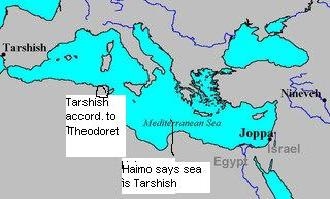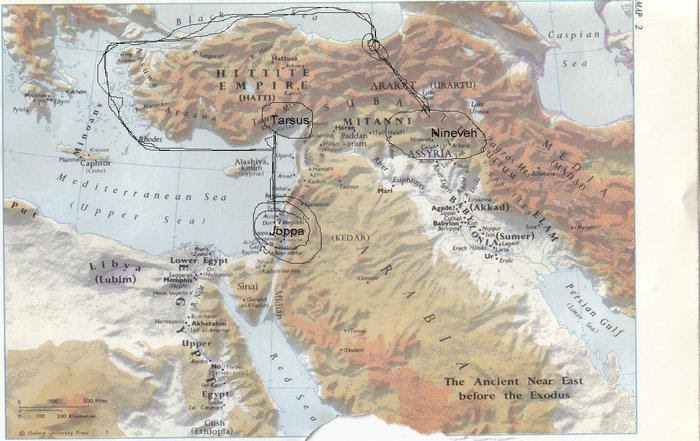1 Now the word of the LORD came to Jonah the son of Amittai, saying, 2 "Arise, go to Nineveh, that great city, and cry against it; for their wickedness has come up before me." 3 But Jonah rose to flee to Tarshish from the presence of the LORD. He went down to Joppa and found a ship going to Tarshish; so he paid the fare, and went on board, to go with them to Tarshish, away from the presence of the LORD. 4 But the LORD hurled a great wind upon the sea, and there was a mighty tempest on the sea, so that the ship threatened to break up. 5 Then the mariners were afraid, and each cried to his god; and they threw the wares that were in the ship into the sea, to lighten it for them. But Jonah had gone down into the inner part of the ship and had lain down, and was fast asleep. 6 So the captain came and said to him, "What do you mean, you sleeper? Arise, call upon your god! Perhaps the god will give a thought to us, that we do not perish." 7 And they said to one another, "Come, let us cast lots, that we may know on whose account this evil has come upon us." So they cast lots, and the lot fell upon Jonah. 8 Then they said to him, "Tell us, on whose account this evil has come upon us? What is your occupation? And whence do you come? What is your country? And of what people are you?" 9 And he said to them, "I am a Hebrew; and I fear the LORD, the God of heaven, who made the sea and the dry land." 10 Then the men were exceedingly afraid, and said to him, "What is this that you have done!" For the men knew that he was fleeing from the presence of the LORD, because he had told them. 11 Then they said to him, "What shall we do to you, that the sea may quiet down for us?" For the sea grew more and more tempestuous. 12 He said to them, "Take me up and throw me into the sea; then the sea will quiet down for you; for I know it is because of me that this great tempest has come upon you." 13 Nevertheless the men rowed hard to bring the ship back to land, but they could not, for the sea grew more and more tempestuous against them. 14 Therefore they cried to the LORD, "We beseech thee, O LORD, let us not perish for this man's life, and lay not on us innocent blood; for thou, O LORD, hast done as it pleased thee." 15 So they took up Jonah and threw him into the sea; and the sea ceased from its raging. 16 Then the men feared the LORD exceedingly, and they offered a sacrifice to the LORD and made vows. 17 And the LORD appointed a great fish to swallow up Jonah; and Jonah was in the belly of the fish three days and three nights.
Commentary on Jonah 1
1:1 The blessed Jonah also made other prophecies, but these references are not mentioned in this composition. But we have learned about these references from 2 Kgs 14:25. (Theodoret of Cyrus)
1:2 Nineveh: This was a Persain city, situated in the east, celebrated and, as the prophet Jeremiah says, 'a land of status.' (St. Cyril of Alexandria)
1:3 Tarshish: Many interpreters today say that it was a Phoenician colony in southern Spain. Josephus believed it meant Tarsus, while Theodoret believed it was Carthage, the capital of Africa. Haimo of Auxerre says, "in Hebrew, however, they speak generally of the sea as "Tharsis." Therefore, the prophet did not wish to flee to any particular place, but he embarked upon a ship which could take him anywhere, so long as he could hurry, not caring where chance led him."
1:5 was fast asleep: It was not that after this happened he went below and was sleeping; it would have been ridiculous if with such alarm raised and everyone’s life at risk he had
surrendered himself to sleep; rather, he did so as soon as he went on board. After describing the storm, the text went on to add what was done by the prophet at that time. (Theodore of Mopsuestia)
1:6 call upon your God: The captain suggested to him to get up and call on his own God in the off-chance of their being |
saved by him. (Theodore of Mopsuestia)
1:8 Since they were idolaters, however, they bade him tell his occupation, his country, and city, and the people he was from, their aim being to learn, in my view, what god he had offended. (St. Cyril of Alexandria)
1:16 They sacrificed to the Lord and made vows, not meaning that they sacrificed to the Lord on the spot, being unlikely to perform sacrifices on board boat, but in the sense that they completely gave up the idols and devoted themselves to the worship of God, promising in the future to join his service and offer due sacrifice to him. (Theodore of Mopsuestia)
1:17 great fish: In the Hebrew we read "a great fish", which the Septuagint and the Lord in the Gospel call a whale, to explain the matter in short. For the Hebrew says dag gadol that we translate as 'a big fish'. Evidently this means a whale. (St. Jerome) Jonah was in the belly: Either all the miracles wrought by divine power may be treated as incredible, or there is no reason why the story of the miracle should be believed. The resurrection of Christ Himself upon the third day would not be believed by us, if the Christian faith was afraid to encounter ridicule. I would be surprised that it would be reckoned what was done with Jonah to be incredible; unless, perchance, one would think it be easier for a dead man to be raised in life from his tomb, than for a living man to be kept alive in the belly of a whale. (St. Augustine) |
Jonah's trip according to Josephus
Jonah Map

|

